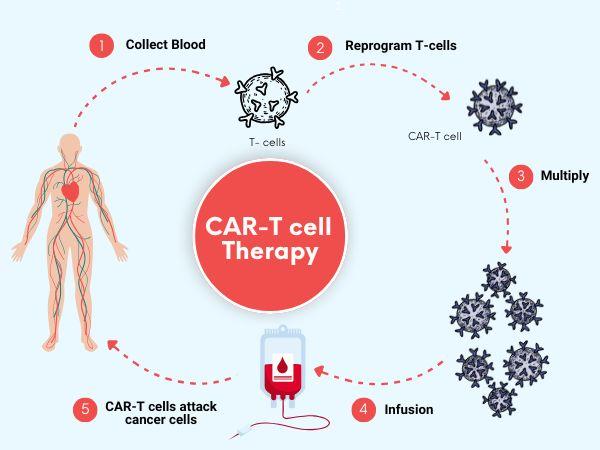Understanding The Outcome What Happens If Car T-Cell Therapy Fails?

Understanding The Outcome What Happens If Car T-Cell Therapy Fails?
A patient’s own immune cells to recognize and attack cancer, CAR T-cell therapy has been transformative for individuals who have not responded to traditional treatments. However, as with any medical treatment, CAR T-cell therapy does not work for everyone, and it fails to deliver the desired results. These antibodies have two receptors on them, typically designed for one receptor to attach to a T-cell and the other to a cancer cell. The bispecific antibody acts like a pair of handcuffs, bringing the two cells together and making it easier for T-cells to detect and attack the cancer cells.
What Does It Mean If CAR T-Cell Therapy Fails?
CAR T-cell therapy works by modifying a patient’s T-cells to recognize specific markers on cancer cells, helping the immune system to target and destroy those cancerous cells. In many cases, this results in a significant reduction or even a complete remission of the cancer. But when CAR T-cell therapy fails, it means that the treatment did not achieve the expected result of either controlling or eradicating the cancer. This could mean:
Why Does CAR T-Cell Therapy Fail?
-
This may happen if the cancer cells downregulate or lose the antigen that the CAR T-cells were designed to recognize, effectively hiding from the immune system.
-
The immune system may deactivate or suppress these T-cells due to an overwhelming tumor load, making them less effective at fighting the cancer.
-
The environment surrounding the tumor can be hostile to CAR T-cells. Certain factors, like immune suppression or the presence of other protective proteins, can prevent CAR T-cells from functioning properly.
-
For CAR T-cells to work, they must multiply in large numbers after being infused into the body. Sometimes, the T-cells do not expand adequately, reducing their ability to fight cancer.
What Happens After CAR T-Cell Therapy Fails?
If CAR T-cell therapy fails, it doesn’t mean the end of treatment options for cancer patients. Several approaches may be taken to manage or address the situation:
A. Exploring Other Treatment Options
-
Chemotherapy: If the cancer continues to grow, chemotherapy may be used to shrink the tumors or control the disease, often as a bridge to other therapies.
-
Stem Cell Transplant: In cases where blood cancers like leukemia or lymphoma have relapsed after CAR T-cell therapy, a stem cell transplant may be considered to provide a fresh supply of healthy immune cells and reset the immune system.
-
Alternative Immunotherapies: Other forms of immunotherapy, such as monoclonal antibodies, or newer forms of CAR T-cell therapies that target different antigens, could offer a path forward.
-
Clinical Trials: For patients whose cancer does not respond to available treatments, clinical trials might offer access to new, experimental therapies that could be effective.
B. Second-Line CAR T-Cell Therapy
In some cases, a second round of CAR T-cell therapy may be an option. This could involve using CAR T-cells engineered to target a different marker or applying a more advanced version of CAR T-cells that are less susceptible to exhaustion or resistance. Clinical trials are also exploring ways to enhance CAR T-cell persistence, overcome resistance mechanisms, and improve outcomes.
C. Managing Side Effects and Toxicity
Even if CAR T-cell therapy fails to eradicate the cancer, side effects from the treatment may still be an issue. Common side effects of CAR T-cell therapy include cytokine release syndrome (CRS) and neurotoxicity.
D. The Road Ahead: Research and Future Therapies
While CAR T-cell therapy may fail for some, it remains a rapidly evolving field. Researchers are continuously working to refine and improve CAR T-cell technology.
Conclusion :
While CAR T-cell therapy has revolutionized cancer treatment for many patients, it is not always successful. When CAR T-cell therapy fails, the next steps will vary depending on the type of cancer, the patient’s overall health, and available treatment options. For some, alternative treatments such as chemotherapy, stem cell transplants, or participation in clinical trials may provide new hope.
If you're facing cancer treatment, it's important to remember that a failure of one therapy doesn't mean the end of the road. New options are emerging, and personalized treatment plans are more advanced than ever before. With continued progress in the field of cancer immunotherapy, there is reason for optimism.
Research URL :- https://bondhusova.com/blogs/171781/Understanding-The-Outcome-What-Happens-If-Car-T-Cell-Therapy
- Art
- Causes
- Crafts
- Dance
- Drinks
- Film
- Fitness
- Food
- Игры
- Gardening
- Health
- Главная
- Literature
- Music
- Networking
- Другое
- Party
- Religion
- Shopping
- Sports
- Theater
- Wellness


